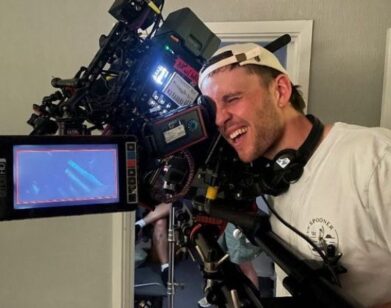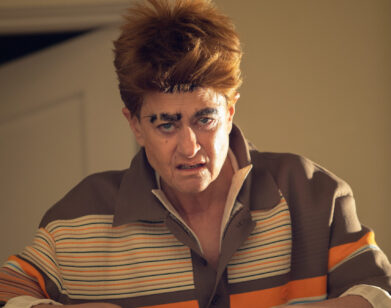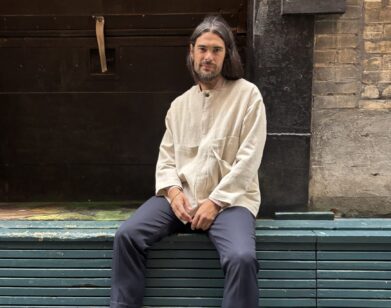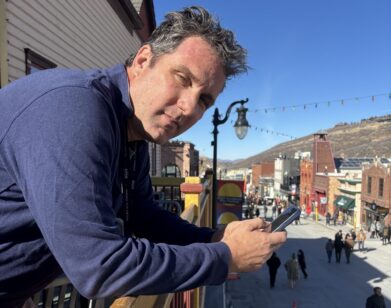no distractions
Grant Singer and Sky Ferreira on the Gift and the Curse of Seeking Perfection

For every generation, there’s a handful of maverick directors who shape the landscape of what a music video can be. Grant Singer is certainly one for his, having crafted indelible pop imagery for some of the biggest and most revered artists in music. It was he who blew up The Weeknd’s overturned limousine (and lit him on fire, buried him alive, took him on a drive with a panther, and helped him purge a murder of crows, to name a few scenarios). He’s sent Lorde sailing through “Green Lights” hanging out the window of an S.U.V., encircled Taylor Swift and Zayn as they enact a doomed romance in a London hotel, cruised a strobing warehouse with Troye Sivan, got Ariana Grande to let down her ponytail, and even tore off Pusha T’s face to reveal Dennis Rodman (in a speeding convertible). Always drawn to the unnerving and the idiosyncratic, Singer often eschews big commercial jobs in favor of communing with the underground—his videos with Ariel Pink are a familiar hallucination to fans who stray from pop normativity, as is his work with bands like Slowdive, Shayne Oliver’s WENCH, Foxygen, The Soft Moon, and DIIV.
With Shawn Mendes: In Wonder, which hit Netflix last week, the director embarked on his first feature-length documentary. Chronicling a tour cycle amid candid home video flashbacks and intimate one-on-one time with Mendes and his popstar girlfriend Camila Cabello (Singer has also directed a video for her), the film offers a lush sense of intimacy and virtuosity of scale as it vacillates between hotel rooms, backstage bathrooms, and arena stages before tens of thousands of apoplectic fans. To mark the film’s release, Singer sat down via Zoom with his frequent collaborator Sky Ferreira to discuss not just the documentary, but how music and cinema intertwine, the artistic process, and tuning out the distractions.
———
SKY FERREIRA: I’ve only done two Zooms in my life. This is like season two of Mindhunter with the guy that gets his face blown off and they won’t show his face.
SINGER: Sky is shrouded in a closet. You see an animal come into the foreground. It’s basically the scenes from inside the well in Silence of the Lambs. By the way, I was thinking about when we first met and I didn’t realize you were such a cinephile.
FERREIRA: I’ve been spending the last four years just watching movies. I literally have no life. It’s not that I know more about film than I do music, but I feel most of my music is visual to me. It’s not like “I see colors” or something.
SINGER: You’re not going to be like every musician right now and say you see colors when you hear music?
FERREIRA: No, I’m not one of the younger people who all have that.
SINGER: It’s so weird, every musician can hear colors but nobody else can.
FERREIRA: It’s just color association. Like everything else, music is associated with memories.
SINGER: You’re very particular about what you listen to but you will watch everything.
FERREIRA: But aren’t you a similar way except the other way around?
SINGER: Yeah, I think I listen to more music than I watch film. I watch the same ten movies over and over again. It’s not that I don’t watch movies, I just tend to fall in love with certain ones and then watch them on repeat. I was so obsessed with this one John Cale song that I wrote an entire screenplay inspired by this one particular piece of music. It’s interesting how one song or piece of music can evoke an entire world.
FERREIRA: I have a similar thing, I notice. The title of my last album [Night Time My Time] is a line from a movie.
SINGER: Is it still like that, with the new album?
FERREIRA: Definitely. I’ve made music my whole life but I was never taught how to make music. I didn’t grow up with people who made music, so it comes to me in a way where it’s almost like a projector in my room. I see something visually, and then try to capture it.
SINGER: With your new album, are there films that are inspiring what you’re doing at the moment?
FERREIRA: I feel like there are so many that it’s hard to go down a list. It’s not that I’ll hear a line from a film and be like, “that’s the lyric,” but something small can trigger an entire song. Someone will say something a certain way, or there will be one little detail that is so small that no one else would recognize it, and it can unleash an entire thing. And when I listen to music, it’s the small details I like most in a song. I’ll hear something almost like a frequency someone else won’t hear and it will be my favorite part of the whole song. I watched Mank recently—I fucking love that movie by the way—and the fact they nailed down every detail, not just the lighting or the transitions, but the way the light can reflect in someone’s eye, that is kind of stuff I notice and get inspired by. The in-between moments.
SINGER: Or just someone’s voice. I love that actor Philip Stone. He is, I think, the only actor ever to be in three consecutive Kubrick films. He played Pa in A Clockwork Orange, he was the doctor in Barry Lyndon, and he was Grady in The Shining. “I corrected them, sir.” I can go on and on about that bathroom scene, which is my favorite scene from that film, but it’s the quality of his voice and the fact that he and Jack Nicholson are both not moving, and the camera’s not moving, and you feel really claustrophobic. You can analyze that scene for hours and talk about how it’s constructed and how it’s acted, but it’s the quality of Philip Stone’s voice that is really haunting. You have an interesting voice in that way. I also think about Robert Blake in Lost Highway.
FERREIRA: Oh my god, I just saw Robert Blake. He was in Little Rascals or something, in the fucking ’30s or some shit. And I was like, Robert Blake?!
SINGER: [Laughs] Someone needs to make a movie about Robert Blake on the set of Little Rascals as the sequel to Lost Highway.
FERREIRA: [Laughs] I think he was the bad Little Rascal, too.
SINGER: When I watch films, sometimes it’s hard for me to just let a film wash over me without observing the filmmaking. I love when a movie can do that, and a good example is The Souvenir.
FERREIRA: I love that movie.
SINGER: That’s an example of a film that just washed over me, and it was so disarming. When you listen to music, do you have that same thing where you can’t stop thinking of how it’s constructed and how it’s made, or can you allow it to envelop you how it’s meant to?
FERREIRA: I think it depends where my head is at and what I’m doing. Subconsciously, it’s not that I don’t listen to new music when I’m making an album, but I feel if I’m listening to someone constantly, I’m bound to be influenced by it. I’m trying to come from a place where I’m not just influenced by my surroundings and what’s happening around me musically.
SINGER: I couldn’t agree more. We’re so susceptible to our environment. I think some people, even if they’re not influenced by Kubrick, have been influenced by Kubrick because his films have become ingrained in the public consciousness. That’s one of the reasons I’m very discerning about what I see. What have you been listening to?
FERREIRA: All I do is pace around with headphones on. I’m constantly listening to stuff. Even the humming of a radiator will trigger something in me. I write a lot of stuff, but when I’m producing, since I’m not from a technical background, I’m not like “play C” or something. I like to try things a million different ways, which drives people crazy. That’s why it takes me forever. When I’m communicating these things to someone, how I want it to sound, it’s almost like dating. Making music is like dating someone. And if I’m collaborating with someone in any way, even if they are playing something of mine, the reason I’m asking them is because I see there’s something I notice that they do. I want them to bring that, while doing what I say. I guess it’s a little like directing. I’ll be like, “Imagine I have a box. Right? And I have two snakes in it. Just imagine you’re shaking the box and then you accidentally trip, but you still have to hold the box together. So fall into the beat like that.” Is that how you’ve approached music videos?
SINGER: Making music videos, when it’s just making things with friends of mine, has always been the most fun. Not just the artists themselves, but the people behind the camera, the production designers, the cinematographers, everyone. That’s the most fun.
FERREIRA: You have a really good eye for finding people and showing them at their most charismatic. There are a lot of people who can find cool-looking people, but you always know how to do a little more. You capture someone’s spirit in ways that other people can’t.
SINGER: I like to strip away the façade. I want to get underneath skin, if that’s possible. A lot of it is how you edit. It’s finding the moment. Sometimes people may edit for a certain action, but I like to edit more for moments where people let their guard down, because those in-between moments are what I’m struck by. You can learn a lot about a person through the slightest of actions.
FERREIRA: You have good taste and such a good visual eye, but also a lot of control. Was it hard to find that same expression, and finding the right moments, in a documentary?
SINGER: I think you just have to be patient. When you’re making a documentary, it’s almost a complete opposite form of directing. When you’re making a music video, you put so much effort and planning into producing magic moments or creating environments where magic can happen. If you’re making a documentary, you have to be invisible. The more invisible you are, the less planning you do, the less imprint you have, the greater the chance that something magical will happen.
FERREIRA: Do you like your sense of humor to bleed through? I love David Fincher’s work for that reason. Do you ever intend to capture your sense of humor? I feel like it does come across in the most subtle way.
SINGER: There’s truth to that when I’m making work with like-minded people—like you, Sky—who have similar sensibilities and tastes. But other times, when I haven’t, I think it would be irresponsible of me to impart too much of my own thing onto someone else, because your job as a music video director is to make something for someone else, where you give them the best version of what they want. I’m imparting my sense of humor now in a lot of the things I’m writing.
FERREIRA: Now that you’re focusing on your own stuff, is it nice to not have to share the reins?
SINGER: I developed a very specific muscle making music videos and I’m so grateful for it. I could not be more grateful for the experiences and opportunities I’ve had, but I feel like now it’s time to do something else. It’s time to communicate a different part of me through film.
FERREIRA: Is there anything inspiring you right now?
SINGER: Some of the performances from certain [John] Cassavetes films are at the forefront of my brain, just because I’ve been thinking about them and how unflinching and daring they are.
FERREIRA: I’ve always loved watching his interviews. I watch a lot of interviews with people, not necessarily to see what they say but to watch their mannerisms. I’m a people watcher.
SINGER: He’s so honest. I keep saying this word, but he was so unflinching in his desire to make something real, because the more real it was, the more effective it was, because it would strike our souls and not our mind.
FERREIRA: There are certain things in life you can’t fake.
SINGER: I think that to make great art you have to live as an artist. Great art comes from people who’ve sometimes lived wild lives and have had traumatic experiences. And through the intensity of their lives, they were able to reflect something that made you feel something, and it’s a feeling you want to get lost in. There are certain people who have great voices, right? Like you, for example, have an unbelievable voice. Mariah Carey has an unbelievable voice. But the best moments are when you hear that person sing and it gets raspy, because there is so much passion in what they’re singing that it comes through almost in a discordant way.
FERREIRA: I’ve embarrassed myself a lot in the past. People make fun of it, but now it’s cool to be that sensitive and flawed. I used to have a bad habit of crying while I was singing.
SINGER: That’s amazing.
FERREIRA: I would be crying and shame-spiraling at the same time while doing it because it was embarrassing. And I don’t look pretty when I cry. I kind of like that it’s unsettling for people. Do you ever have that moment where it clicks when you’re directing?
SINGER: Yes.
FERREIRA: I don’t know how else to explain it. It’s like a high or something.
SINGER: Yes it is. Let’s say the camera is moving a way that feels perfect and effortless and like it’s being motivated by the action and by the block on the screen. Then when the performance is raw and real and moving in a way that feels alive, and untethered by a direction, it’s like you’re witnessing something. Then there’s that perfect symmetry between exacting and unpredictable. When that all happens, it’s a euphoric feeling.
FERREIRA: Everything sort of aligns.
SINGER: Yes, and it’s hard to reproduce.
FERREIRA: With music, there are those moments, and I do set off for that, but I’m also very adamant about making sure I have all things covered. I’m a bit of a perfectionist in a way, compared with most people. Something that is good enough for someone else, they’ll say “Why are we doing it again?” Not because the magic moment necessarily happened, but because it’s just good enough, and I’m like “No.”
SINGER: We have that in common. You’ve played me some of your new songs and I’m like “Sky that sounds fucking incredible,” and you’re like “No, no, it’s not even close.” And I’m like “What?!” But it’s because you’re trying to achieve something that only you can see or hear or fully know. And you’re not going to let it out until it’s there.






